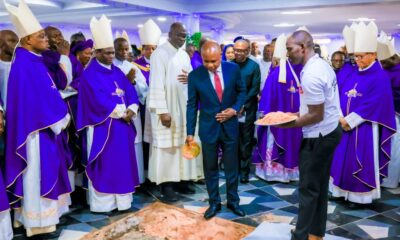The National Economic Council (NEC), has appointed Enugu State Governor, Dr. Peter Mbah, as Chairman of a newly constituted high-powered committee tasked with overhauling Nigeria’s security training institutions, in a move aimed at strengthening the country’s security architecture and professionalizing its enforcement agencies.
The announcement was made during the 152nd meeting of the Council held at the Presidential Villa, Abuja, where members unanimously endorsed President Bola Ahmed Tinubu’s proposal for a comprehensive modernization of training facilities across all security agencies, including the Nigeria Police Force, Nigeria Security and Civil Defence Corps, and other paramilitary institutions.
Governor Mbah’s appointment is widely viewed as a testament to his reform-driven leadership, innovative governance model, and proven track record in institutional transformation within Enugu State.
His administration has been credited with championing modern governance strategies, digital transformation, and forward-looking policies designed to reposition Enugu as a hub for investment and efficiency.
The committee, according to NEC’s directive, has one month to develop and submit a detailed blueprint for the modernization and harmonization of training curricula, infrastructure, and operational standards in security training institutions nationwide.
Joining Governor Mbah on the committee are several distinguished members:
Former Inspector-General of Police, Baba Usman, who will serve as Secretary;
Governor Uba Sani of Kaduna State;
Governor Dapo Abiodun of Ogun State;
Governor Kefas Agbu of Taraba State;
Governor Umoh Eno of Akwa Ibom State;
Governor Dauda Lawal of Zamfara State; and
Governor Abdullahi Sule of Nasarawa State.
Speaking at the session, President Tinubu underscored the urgency of reforming Nigeria’s security training system, describing it as a foundational step in restoring discipline, professionalism, and excellence within the security sector.
“We cannot have a modern, effective security apparatus without adequately trained personnel and properly equipped institutions. This reform is about rebuilding confidence, competence, and capacity,” the President stated.
President Tinubu further emphasized the importance of improving both training facilities and the welfare of instructors and trainees, noting that the quality of human capital within security institutions directly impacts national stability and development.
Governor Mbah, in his brief remarks following the announcement, expressed gratitude for the confidence reposed in him and reaffirmed his commitment to delivering a pragmatic and transformative roadmap that aligns with the President’s vision of a safer and more secure Nigeria.
The Council’s decision marks the beginning of what analysts describe as one of the most ambitious institutional reform efforts in Nigeria’s recent history, signaling a shift toward a more coordinated, intelligence-driven, and professional security framework.
The committee is expected to submit its final report to the Council within four weeks, paving the way for phased implementation of the recommended reforms.

 NEWS2 years ago
NEWS2 years ago
 MUSIC4 years ago
MUSIC4 years ago
 MUSIC4 years ago
MUSIC4 years ago
 MUSIC2 years ago
MUSIC2 years ago
























